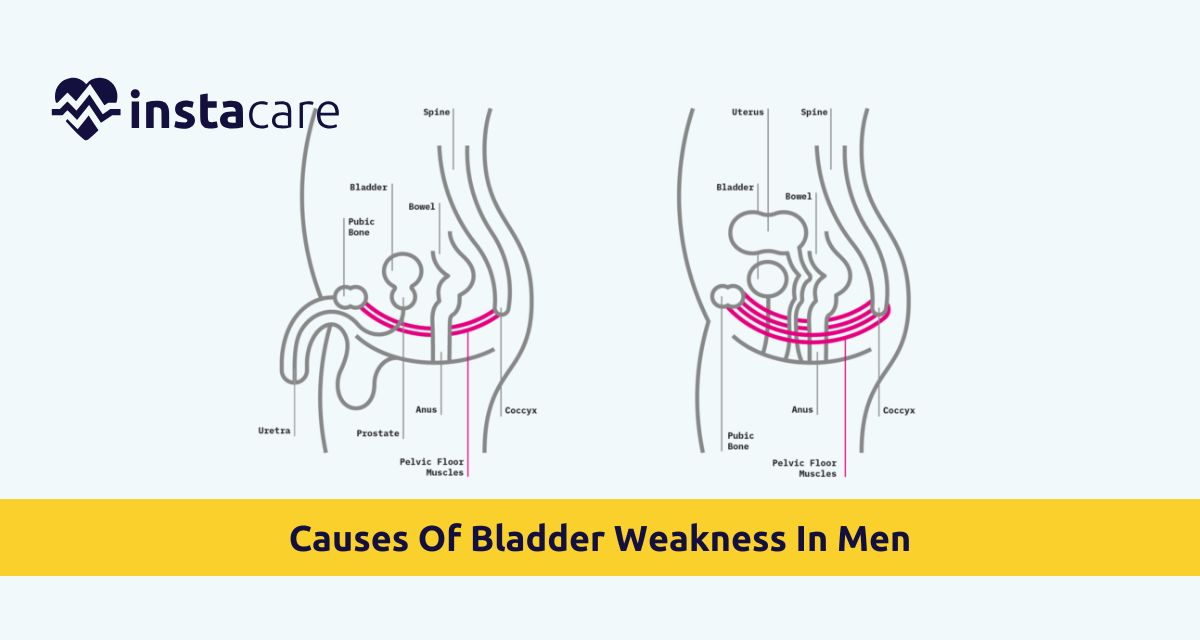It can make the lives of men suffer immensely, bringing pain and social problems. Bladder problems among men are a health issue that can result from numerous factors, such as various medical conditions, lifestyles, or treatments. With awareness about the causes, the disease can be avoided or handled. Here are five causes of bladder weakness in men.
1. Bph Or Benign Prostatic Hyperplasia
This gland near the bladder is called the prostate. Its name
is benign prostatic hyperplasia because it becomes hypertrophied in an elderly
age of men. There it can press on either on the bladder or also compress the
urethra thereby causing urinary problems - weakening of the bladder, inconstant
urination, very small stream.
How BPH Affects Bladder Function:
- Increased pressure within the bladder does not allow it to
empty fully.
- Narrowed urethra causing a weak or interrupted flow of
urine.
- Frequent urge to urinate, particularly at night, because of not emptying the bladder satisfactorily.
Managing BPH-related bladder weakness
- Medications, for example, alpha-blockers can likewise assist
with quieting the muscles in the prostate accordingly making less tension
around the bladder.
- In less obtrusive strategies, transurethral resection of the
prostate (TURP) is feasible to shave off the abundance development.
- Any man is prescribed to visit a urologist consistently to determine potential issues to have the prostate and control the side effects.
2. Nerve Damage
Neurological infections around the spinal line or mind can
modify motioning from the cerebrum to the bladder and consequently influence
bladder control known as Nerve damage. Diabetes, different sclerosis, stroke,
spinal line wounds are only not many of the infections that might cause nerve
damage. Whenever nerves influencing the bladder muscles are compromised, one
might see that as his/her bladder is feeble and can set off earnestness and
incontinence.
Conditions Causing Nerve damage to the Bladder:
- Diabetes: When glucose is raised and supported it causes
diabetic neuropathy, which influences nerves that control the bladder also.
- Spinal Rope Wounds: These can impede the signs from the mind
to the bladder, thus practising command over the bladder is compromised.
- Parkinson's Sickness and MS: These neurological issues cause
a deficiency of nerve strength and can add to incontinence.
Treatment for Nerve-Related Bladder Weakness:
- Bladder Training: Various ways in enhancing control and
power in muscles.
- Medications: This can be controlled by particular drugs that
are available in the market to contain urgency and frequency.
- Catheterization: Very occasionally if there are specific problems with emptying the bladder, it may be necessary to introduce a catheter to help to pass urine.
3. The Study Of Obesity And Physical Inactivity
Obesity also adds pressure to the bladder and working
muscles when regulating the amount and time of urine release. Overweight and
inactivity lead to a diminished tone of the pelvic floor muscles that hold the
bladder and assist in bladder control. In the long-run this may cause what is
known as urinary incontinence and bladder weakness.
How Obesity Contributes to Bladder Weakness:
- Thus, more abdominal fat puts pressure on the bladder.
- Lack of exercise results in weak pelvic floor muscles which
affects bladder control.
- Increase by the probability of developing other related diseases, including diabetes that also affects the bladder.
Lifestyle Changes for Managing Weight-Related Bladder Issues:
- Exercise: Kegel exercises and other forms of pelvic origin
exercises can help one gain control of bladder.
- Weight Management: Simply changing the weight status can
cause changes and eliminating pressure on the bladder may correct it.
- Diet Adjustments: The Usual Measures that Self-employed men can adopt include avoiding bladder irritants, for instance, caffeine and spicy foods.
View More: How to Fix a Prolapsed Bladder without Surgery
4. Urinary Tract Infections And Long Term Intestinal Inflammation
UTI and chronic inflammation of the urinary system cause
irritation of the bladder wall and its muscular layer, and a person may
experience increased bladder sensitivity, increased frequency of the urge to
urinate and urges to leak. Due to this, men and in particular older people can
fall victim to UTI infections even though they are more prevalent in women.
Signs of UTIs and Inflammation-Related Bladder Weakness:
They regularly experience a sudden urge to urinate even if
only a small amount of urine will be passed.
When you have the urge to wee, you may have a burning
feeling around your ‘private part’ or have a dull ache around your tummy
button.
Ketones and sometimes blood in the urine, or more often, a
cloudy or foul-smelling urine.
Preventing and Managing UTIs and Inflammation:
- Antibiotics: Usually forced by a physician, antibiotics are
known to be successful in treating UTIs.
- Regular Check-Ups: Boys and men experiencing repeated UTIs should undergo further examination to rule out conditions such as kidney stones or a prostate gland problem.
5. Medications And Medical Treatments
Some of the groups of drugs that might have side effects on
the bladder that include diuretics, drugs that used to treat depression and
muscle relaxing drugs. Mostly, bladder weakness can be attained as a side
effect of specific medical operations, those related to the prostate or pelvic
area particularly. Some treatments such as Radiation therapy for prostate
cancer may cause the bladder to be irritated leading to incontinence or
frequent urgency to void.
Medications and Treatments That May Cause Bladder Weakness:
- Diuretics: Because frequent urination, more often than usual
and could at times lead to some level of incontinence.
- Antidepressants and Antipsychotics: May help to relax bowel and bladder muscles leading to inability to control one's bowel or bladder movements.
Strategies to Manage Medication-Related Bladder Issues:
- Medication Adjustments: Take medications to a doctor if they
lead to bladder problems and ask the doctor for other doses or medications that
are safer.
- Pelvic Floor Exercises: Some of the side effects of the
treatment can be minimized by exercising the pelvic muscle.
Tips For Managing Bladder Weakness In Daily Life
Apart from eradicating these causes, following some tips goes a long way to aid the bladder muscles and lessen symptoms. Here are some tips for men dealing with bladder weakness:
Practice Bladder Training
Facial expressions refer to the technique where a specific
time table is set in order to help a patient develop control on the bladder.
This procedure can slowly expand the duration between going to a washroom hence
recovering from incontinence.
Tone up the muscles in the pelvic forum
Specific simple exercises such as Kegels that involve the
muscles that hold the bladder in place help to make the muscles strong. This is
because the muscle that is involved in controlling leakage is created and hence
the need to make them strong.
Limit Caffeine and Alcohol
Caffeine as well as alcohol are diuretics and they increase
the chance to worsen the positions of the bladder muscles. Taking less is also
likely to reduce the chances and the level of urgency of the episodes.
Drink fluids (but don’t drink too much of them)
The patient should remain adequately hydrated but avoid
overindulgence because this may worsen the condition since bladder pressure raises
the frequency of the urge to urinate. Avoid drinking too much during the day,
but also try to keep the water levels up to a reasonable level.
Wear absorbent products only in case it is needed
An additional layer of protection that can be used includes pads
or undergarments because if you are going to function, then you would require an extra easel.
Final Thoughts
Male urinary incontinence can have various causes, ranging
from disease and injuries to the prostate and nerves, to one’s lifestyle, and
medications. However, if the bladder problems either fail to resolve, or worsen
throughout time, it is advised to seek medical help and make a proper plan.












